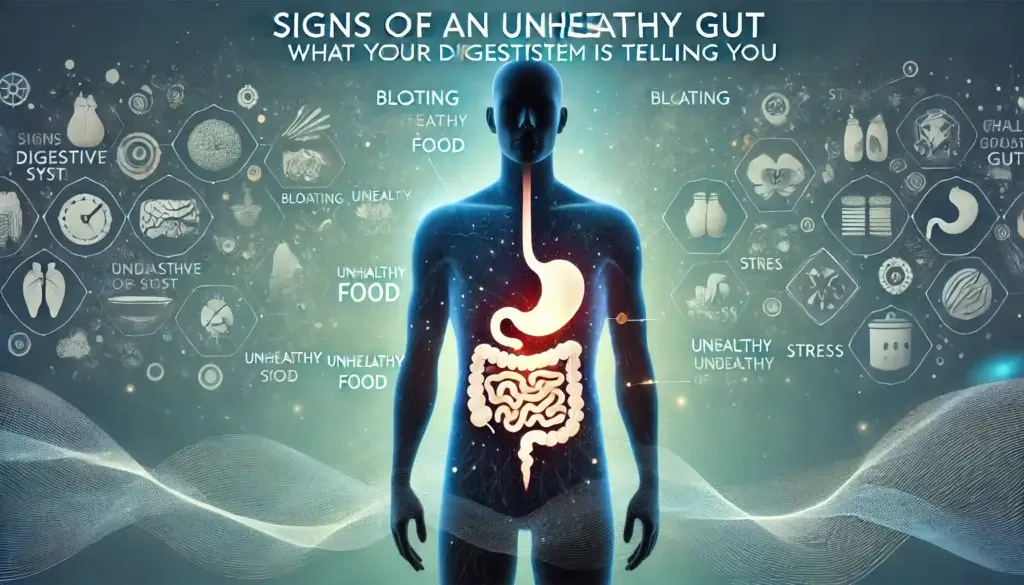Until now, did you know that your gut affects your entire body? Research demonstrates that poor gut health is associated with a wide range of diseases. Recognizing these signs is essential for restoring balance and correcting digestion.
Your gut — also known as your GI system and gastrointestinal tract — is a complex array of organs and microorganisms. It is a critical component of your health. If it’s out of whack, the body gives clear indications, including digestive issues and mood alterations. Awareness of these red flags allows you to act preventatively for your gut.
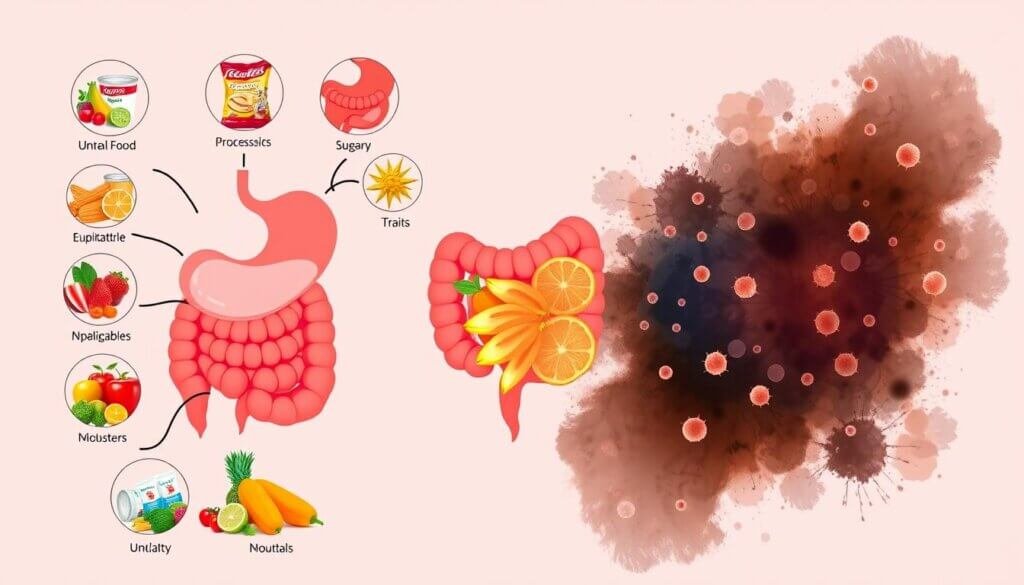
Key Takeaways
- An unhealthy gut can contribute to a wide range of health issues, from chronic inflammation to mental health disorders.
- Recognizing the signs of an unhealthy gut is the first step towards restoring balance and optimizing your digestive function.
- Your gut sends clear signals when it’s out of balance, such as persistent digestive discomfort and unexplained mood changes.
- Addressing the root cause of gut imbalance can help support your overall well-being.
- Taking proactive steps to support your gut health is crucial for maintaining optimal health and wellness.
Understanding Your Gut Health: The Foundation of Wellness
Your gut health is key to feeling good. It’s all about the gut microbiome, a world of tiny life forms in your belly. This balance is vital for your digestive issues and gut health. It affects more than just your gut problems signs.
The Gut Microbiome and Its Impact on Overall Health
The gut microbiome does many important jobs. It helps with digestion, absorbs nutrients, and boosts your immune system. It also affects your mood. If it’s off balance, you might face health problems like inflammation and metabolic issues.
Signs of Poor Gut Health
Research shows a strong link between your gut and brain, known as the “gut-brain axis.” This connection lets your gut talk to your brain. A healthy gut is key for your mental and emotional health.
| Gut Health Benefits | Potential Gut Health Concerns |
|---|---|
|
|
Knowing how important gut health is, you can start taking care of your gut microbiome. This is the first step to a healthy, whole body.
Signs of Poor Gut Health: Key Warning Signals
Your gut health is key to your overall well-being. When it’s not right, you might feel physical, emotional, and mental symptoms. Knowing the signs of poor gut health is the first step to fixing any issues and getting your digestive system back in balance.
Physical Symptoms to Watch For
Look out for bloating, constipation, diarrhea, gas, and abdominal pain. These could mean you have leaky gut syndrome. This is when your gut lining gets damaged, letting bad stuff into your blood.
Emotional and Mental Health Indicators
Your gut and brain are closely linked. So, poor gut health can affect your mood and mind. You might feel anxiety, depression, brain fog, and mood swings if your gut microbiome is out of balance.
Changes in Bathroom Habits
- Frequent or irregular bowel movements
- Undigested food in stool
- Unusual color or consistency of stool
- Difficulty with bowel movements
Notice any changes in your bathroom habits? These can be signs of poor gut health and digestive problems.
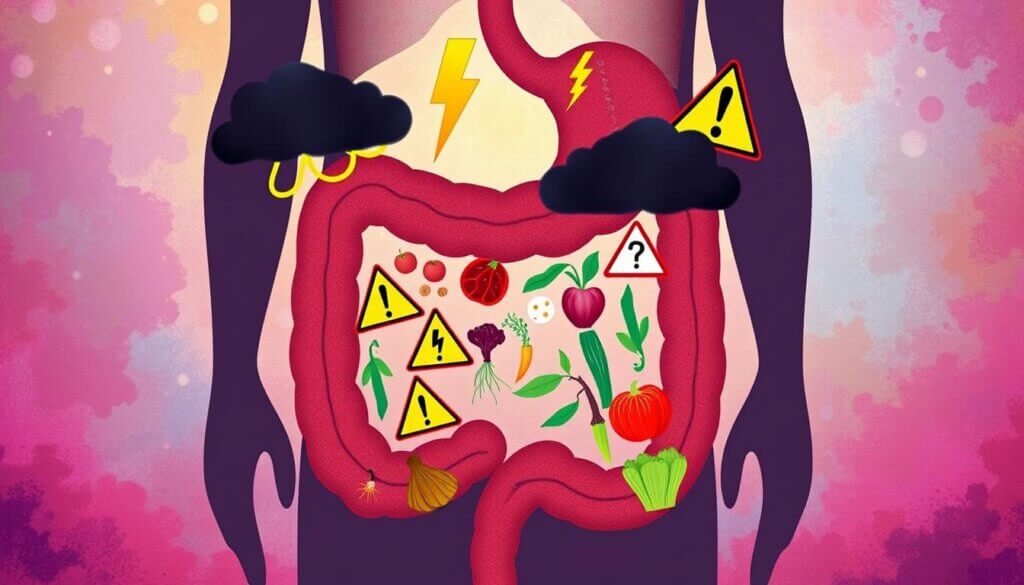
By spotting these warning signs, you can start taking care of your gut health. A healthy gut is the base for a healthy body and mind.
Digestive Issues and Their Connection to Gut Imbalance
It believes your gut health is essential for overall well-being. When it is out of balance, you could experience digestive issues. Understanding how these issues are connected to gut imbalance makes it possible to correct them and restore balance in your body.
Chronic digestive discomfort such as bloating is a common indicator of gut imbalance. It could manifest as bloating, gas, constipation, diarrhea or stomach pain. These signs signal to your body that there’s something amiss with your gut microbiome.
Another sign of an imbalance in the gut are food sensitivities. If your gut isn’t working correctly, you could become sensitive to certain foods. This may lead to nausea, headache or skin problems. Eliminating these foods improves your gut health.
Gut imbalance may also lead to IBS (irritable bowel syndrome) and other inflammatory bowel diseases. These conditions cause chronic digestive pain, and can seriously impact your life. Getting to the bottom of what’s going on with gut health is essential for feeling better.
| Digestive Issue | Connection to Gut Imbalance |
|---|---|
| Bloating and Gas | Overgrowth of harmful gut bacteria can lead to excessive gas production and digestive discomfort. |
| Constipation | Imbalance in the gut microbiome can slow down digestion and cause sluggish bowel movements. |
| Diarrhea | Gut dysbiosis (imbalance) can contribute to an overgrowth of bad bacteria, leading to loose stools and frequent bowel movements. |
| Abdominal Pain | Inflammation and irritation in the gut, often linked to gut imbalance, can cause chronic abdominal discomfort. |
Fixing gut imbalance can help with these digestive problems. Eating well, taking probiotics, and supporting your gut can change your health for the better.
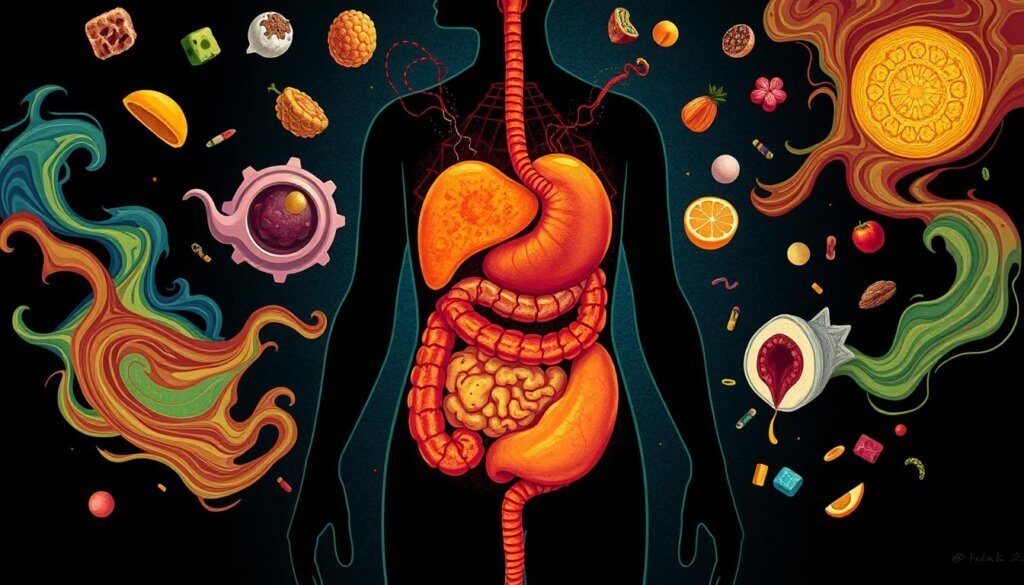
How Food Sensitivities Reveal Gut Problems
Your gut health is key to your overall health. Food sensitivities can show when your gut is not balanced. Certain foods can cause bad reactions, hinting at digestive system issues.
Common Food Triggers
Some common foods that might show gut problems include:
- Dairy products
- Gluten-containing grains
- Processed and fried foods
- Spicy or acidic foods
- Caffeine and alcohol
If you get bloated, gassy, or have stomach pain after eating these, it might mean your gut health is off.
Tracking Your Food Reactions
To find out if you have food sensitivities and how they affect your gut, watch how your body reacts to food. Here are some tips:
- Keep a food journal, noting what you eat and any symptoms that follow.
- Try removing suspected trigger foods one at a time to see if symptoms lessen.
- Consider an elimination diet, where you remove possible problem foods and then add them back to see how you react.
- See a healthcare professional, like a registered dietitian, for help with food sensitivities.
Understanding the connection between food sensitivities and gut health helps you support your digestive system and overall health.
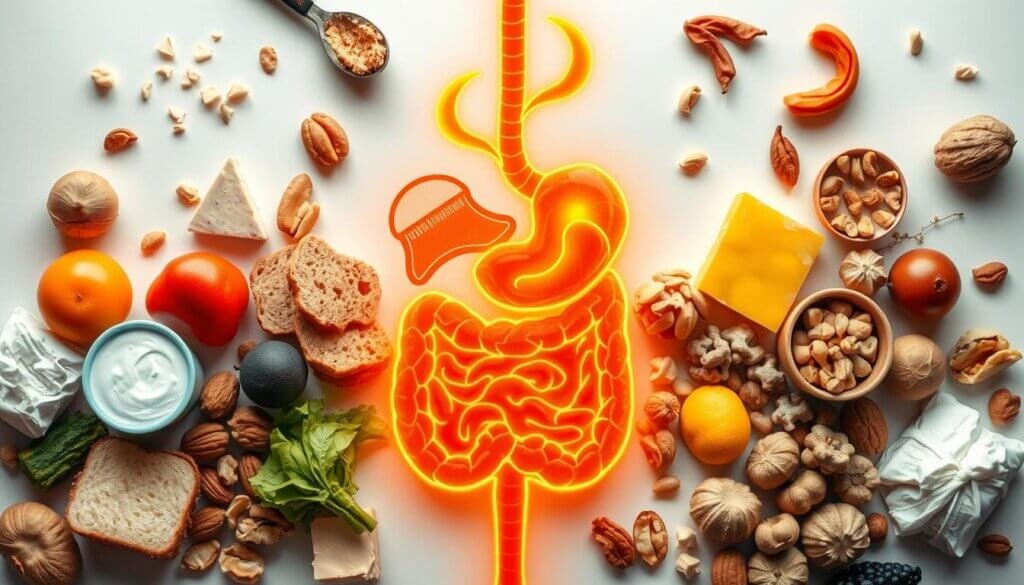
The Link Between Weight Changes and Gut Health
Your gut health is key to managing your weight. An imbalance in gut bacteria, or dysbiosis, can lead to weight gain or loss. This imbalance affects how your body processes nutrients and controls hunger.
An unhealthy gut can cause weight gain by increasing inflammation. This inflammation messes with hormones that control hunger. It can also make you feel tired, making it hard to stay active and burn calories.
On the other hand, an unhealthy gut can also cause weight loss. Issues like small intestinal bacterial overgrowth (SIBO) or inflammation can make it hard to absorb nutrients. This can lead to malnutrition and weight loss. Fixing gut problems is crucial for a healthy weight.
Looking for more tips and insights? Explore our other articles in our Fitness blog!
FAQ
What are the common signs of an unhealthy gut?
Signs of an unhealthy gut include bloating, gas, and digestive issues. You might also notice unexplained weight changes, skin problems, and fatigue. Mood swings are another indicator.
How does the gut microbiome impact overall health?
Your gut microbiome is key to your health. It affects your immune system, how you absorb nutrients, and your metabolism. It also influences your mood and mental health through the gut-brain connection.
What are the physical symptoms to watch for with poor gut health?
Poor gut health can cause chronic inflammation and digestive problems. You might also experience food sensitivities, skin issues, and unexplained aches and pains.
How can changes in bathroom habits indicate gut problems?
Changes in bathroom habits are a sign of gut problems. This includes persistent constipation, diarrhea, or changes in stool color and consistency. These changes suggest an imbalanced gut microbiome.
What is the connection between food sensitivities and gut health?
Food sensitivities can signal gut problems. Paying attention to how your body reacts to food can help find gut health issues. It’s a way to identify potential triggers.
How can gut health affect your weight and energy levels?
An unhealthy gut can affect your weight and energy. It can lead to weight gain or loss and chronic fatigue. This is because it impacts your metabolism, nutrient absorption, and hormonal balance.

